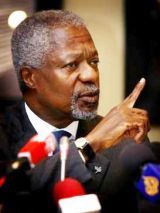UN not given up on Darfur force plan-Annan
Nov 15, 2006 (NAIROBI) — The United Nations has not given up on sending its own troops to reinforce a peacekeeping force in Darfur despite strong Sudanese opposition, Secretary-General Kofi Annan said on Wednesday.
 Speaking to reporters in Nairobi, Annan also described the situation on Sudan’s border with Chad as “very fragile and volatile” and said the United Nations might post observers there.
Speaking to reporters in Nairobi, Annan also described the situation on Sudan’s border with Chad as “very fragile and volatile” and said the United Nations might post observers there.
The African Union (AU) has 7,000 troops in Darfur, where some 200,000 people have died in three years of violence and more than 2.5 million have fled their homes — many into Chad.
“We are looking at the possibility of putting U.N. observers or some sort of international presence on the border and working with Chad’s government to ensure refugees there are protected and cross-border attacks are minimised,” Annan said.
“But we have not given up the idea of strengthening the force in Darfur.”
The United Nations hopes to reinforce the AU force with hundreds of peacekeepers and technical support, eventually forming a large “hybrid” force under joint command. Sudan has rejected that, insisting that the AU must remain in charge.
Sudanese Vice President Ali Osman Mohamed Taha, asked to comment on Annan’s remarks, did not rule out the presence of international troops but insisted the United Nations would not lead any force.
“This confirms that everyone is now looking for a new picture,” Taha said. “The participation of the international community (in Darfur) has to come via the African Union … we refuse any troops under the leadership of the United Nations.”
Annan will take part in high level talks on the Darfur crisis on Thursday in Ethiopia, aiming to stabilise the region and improve access for humanitarian workers while pressing ahead with the implementation of the political process.
Sudanese state media said on Wednesday the country had expelled the International Organisation for Migration (IOM) from South Darfur state, accusing it of inciting the 2.5 million people in camps not to return home.
IOM officials said they had not been told of the decision.
The under-equipped and over-stretched AU force has struggled to protect civilians in the huge Darfur region from repeated attack and its mandate expires on Dec. 31.
The conflict broke out in 2003 when local people, mostly non-Arabs, took up arms to fight for a greater share of power and resources. The government then backed Arab militia known as Janjaweed, who have pillaged, raped and killed.
FIGHTING SPREADS
Fighting between the government and Darfur rebels has spilled into both Chad and the Central African Republic.
“We are convinced that the deterioration in the situation in Chad and in Central African Republic could require the deployment of a peacekeeping mission,” Jean-Marie Guehenno, the U.N. undersecretary-general for peacekeeping, told BBC radio.
A U.N. delegation is due to travel to both countries next week to evaluate what form any such mission should take.
The African Union’s Commissioner for Peace and Security Said Djinnit told Reuters observers were crucial. “We cannot talk about the situation in Darfur without talking about Chad and the Central African Republic,” he said in Brussels.
Annan has invited officials from the U.N. Security Council’s permanent members to Thursday’s talks in Addis Ababa, along with others from Egypt, Gabon, the EU and the Arab League. The AU has also invited Libya, Nigeria, Rwanda, Senegal and South Africa.
In Addis Ababa, the Sudanese rebel Justice and Equality Movement (JEM) called for U.N. troops to be deployed to Darfur.
“The African Union force in Darfur has failed to protect civilians,” JEM spokesman Idrees Ibrahim Azong told a news conference. “My message to Thursday’s high-level meeting…is to deploy U.N. troops in Darfur to stop the ongoing mass killings.”
U.N. Deputy Secretary-General Malloch Brown told reporters in Brussels flexibility was needed.
“If it is easier for the Sudanese to accept a largely African force — even if it is heavily supported by logistical communication and other assets by other countries — then as long as it can do the job that’s fine,” he said.
“I don’t think one should get stuck on flags. It’s going to be a hybrid of some kind.”
Jean-Marie Guehenno, the U.N. undersecretary-general for peacekeeping, said on Tuesday Sudan was insisting the AU remain in charge of the force and rejected the idea of a joint command.
According to his speaking notes to a closed meeting of the Security Council, Sudanese President Omar Hassan Bashir was generally supportive of the “lighter option” of U.N. assistance to the AU mission, known as Amis.
In Washington, a senior State Department official urged Sudan to accept the “hybrid offer.”
“The proposal goes a long way to meeting the Sudanese government’s stated concerns about a U.N. force,” the official said, speaking on condition of anonymity.
(Reuters)
